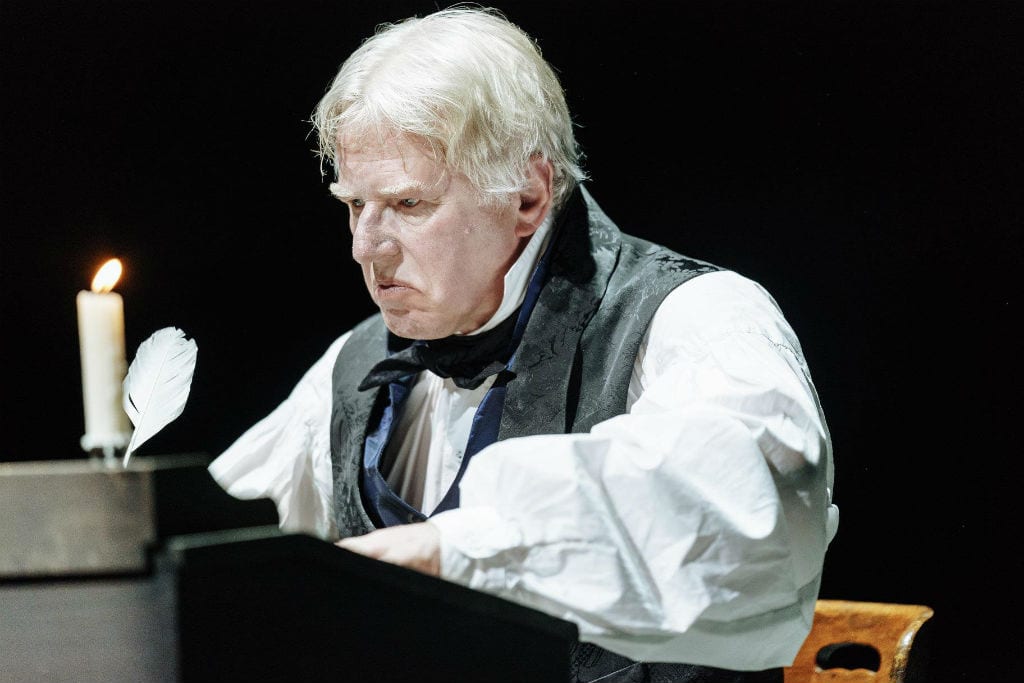David Edgar, who adapted Dickens’s novel Nicholas Nickleby into an 8-hour epic nearly forty years ago, has managed to adapt A Christmas Carol into a mere two and a half hours so that it not only reflects the Victorian era out of which it grew but also refers to our current political and economic attitudes. That means things both positive and negative, of course; including the wonderful, Dickensian creation of Christmas as a symbol for doing good, enjoying life; and (through the early ranting of Ebeneezer Scrooge against the whole holiday) the attitudes that being poor is somehow the fault of the poor and the belief in the “realities of life” that are ultimately selfish, mean-minded and self-centred. Edgar also follows the Dickens novel in portraying not only the shallow narrowness of the attitudes of a Scrooge, but various psychological tropes and types of the business-like, the feckless, the narrow-minded. It is a very thoughtful reading of Dickens. Indeed, cleverly, Dickens himself starts the show along with his friend, editor and biographer John Forster. They are young men of 31 grappling with the hard times of the Bleak House that is the UK and they remain as a presence throughout the show, enabling David Edgar to put some of the most famous lines of the narration into the mouth of Dickens and also to explain in action the context out of which A Christmas Carol first grew. The Royal Shakespeare Company has given this rendition of the famous tale a splendid production, creating a Dickensian/Victorian world on stage that is sumptuous at times, visually attractive and extremely clever in the use of stage craft, and also able to convey the bleakness of the poverty and intolerable working conditions of the era in the mines and factories of a world that was changing because of technology. This is a first rate production of familiar tale that manages to make the telling of the story feel fresh. All the elements of the tale and all the famous episodes are there, but somehow they are able, as they appear, to surprise – and provoke thought.
The casting is exemplary. Nicholas Bishop is very appealing as Dickens and quite believably capable of writing this story and all the other books before and to come. He also doubles as the Young Scrooge at Fezziwig’s Christmas party. Beruce Khan is his perfect foil as John Foster and also as the Young Marley in the sequence telling us how Scrooge got to be as he was and how the business of Scrooge and Marley got going. Brigid Zengeni as the Ghost of Christmas Present, and Viven Parry as the Ghost of Christmas Past are both very impressive in those roles as they are in the others that they double; Giles Taylor is a totally frightening and memorable ghost of Jacob Marley and Gerard Carey is a solid Bob Cratchit, embodying believably the goodness, forgiveness and positivity of his character4. All the young actresses and children pull off their roles with aplomb.
John Hodgkinson is a particularly memorable Fezziwig, and Dinita Gohil an appealing Isabel; while Joseph Prowen is a solid, morally ambiguous and complex Fred, Scrooge’s nephew.
But it is Phil Davis as Ebenezer Scrooge who dominates, as he should; who is weirdly appealing even in his most vicious moments; and who blossoms into the laughing, teasing and utterly generous Scrooge at the end not only in terms of his acting but also against the underlying sense of a contrived ending suggested by the discussions of Dickens and Forster. The design by Stephen Brimson Lewis is totally evocative of the era in which the tale is set; the music by Catherine Jayes is very fine; and I loved the illusions by Ben Hart the choreography by Georgina Lam and the entire mis-en-scene which was pulled together into a superb show by the director Rachel Kavanaugh. The production is taut, well-paced and completely captivating. And do not rush out of the theatre at the end because you want to see the dancing in the curtain calls!
Seeing this production has made we want to re-read the novella for the first time in years to check out how much of the thought-provoking and very moving text was by Dickens and how much is added by David Edgar. This is a pretty flawless production; and the final sequence when Scrooge makes amends wherever he can provoked laughter and tears in the audience in equal measure without ever sinking into a mawkish sentimentality. I just wish this were not seen as a simply seasonal show and that it was going to run and run and run. If I were the BBC or ITV, I would even broadcast it! Meantime, there is a rival and very different production of A Christmas Carol at the Old Vic for comparison.





